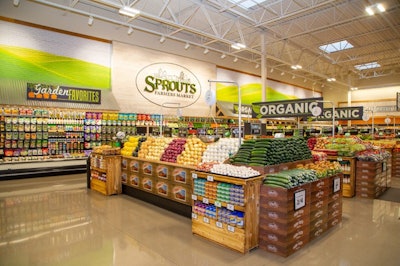
Sprouts Farmers Market has pledged to adopt practices of the Better Chicken Commitment by announcing an updated animal welfare commitment. Taking a phased approach, the company’s commitment includes three steps that will be implemented in their supply chain.
Under the commitment Sprouts released, their chicken producers will need to:
- “Improve the environment for chickens including litter, lighting, and enrichments as per the Better Chicken Commitment standards by 2024. These changes are designed to encourage the natural behavior of chickens such as pecking, scratching, exploration, and play.”
- “Reduce their stocking densities to 6.0 lbs/sq foot and prohibit broiler cages to allow chickens more room to move about by 2025.” (17% of their housing already meets this commitment)
- “Process chickens in a manner that avoids pre-stun handling and instead utilizes a multi-step controlled-atmosphere processing system that induces an irreversible stun (controlled atmosphere stunning or CAS).” “As of 2021, more than 17% of the chicken sold at Sprouts is processed through CAS facilities. We have set a target to increase this amount to more than 60% by 2024 and 100% by 2026.”
Additionally, Sprouts explained that they understand and are monitoring the welfare issues occurring with conventional breeds of chickens raised for meat production (larger breast cuts and meat quality issues), which aligns with the Better Chicken Commitment’s standpoint.
The grocer has committed to sharing their progress annually and verifying the progress through third-party auditing.
“As part of this process, aimed to improve animal welfare, we are engaging our suppliers, non-governmental organizations (NGOs), and other relevant stakeholders to ensure our policies and targets for continuous improvement are progressive, meaningful, and help drive the industry forward,” stated the grocer in their commitment.
The grocer released the statement on August 17. With 383 locations in 23 states across the southwest, store locations mainly reside in California (130 stores), Texas (49 stores), and Arizona (44 stores).


















